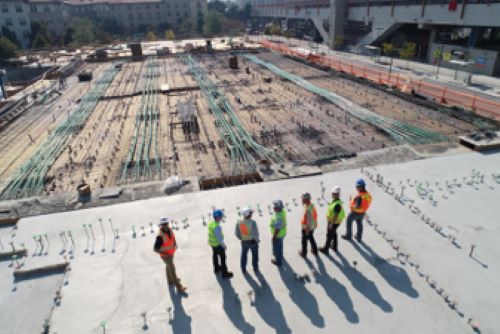

The construction industry is a dynamic sector offering a diverse range of well-paying career opportunities. Far from being limited to manual labor, this industry is a blend of art, engineering, and business acumen.
In this article, we will explore various high-paying roles in the construction sector, emphasizing the fusion of traditional skills and modern education.
Our journey through these professions will not only highlight their financial rewards but also the personal and professional fulfillment they offer. As we delve into the intricacies of the construction world, we’ll uncover how this sector is evolving with technological advancements and how it’s adapting to global trends.
We’ll see how roles in this field are becoming more specialized, requiring a unique combination of technical knowledge, creativity, and strategic thinking.
So, without further ado, let’s get started.
Construction Manager:
A pivotal role in any construction project, the Construction Manager is responsible for overseeing the project from inception to completion. This includes budgeting, scheduling, and ensuring all safety regulations are met.
The success of a project heavily relies on their leadership and organizational skills. To excel in this role, one must have a strong understanding of construction methodologies, excellent communication skills, and the ability to solve problems efficiently.
One way to assume management roles in the construction industry is to acquire an online construction management degree, as it provides you the flexibility to learn while working and imparts advanced knowledge in project management, cost estimation, and other essential aspects of construction management.
Civil Engineer:
Civil Engineers are the visionaries behind the infrastructural marvels that we see today. Their role involves designing, planning, and overseeing the construction and maintenance of building structures and infrastructure.
This includes roads, bridges, tunnels, and buildings. They combine a deep knowledge of engineering principles with a keen understanding of environmental and safety considerations.
Architect:
Architects are the artists of the construction world. They are responsible for designing buildings and spaces that are not only functional but also aesthetically pleasing. Their work is a blend of creativity and practicality, requiring a deep understanding of design principles, building codes, and customer needs.
Quantity Surveyor:
This role involves managing all costs related to building and civil engineering projects. A Quantity Surveyor’s job is to minimize costs and enhance value for money while still achieving the required standards and quality.
They are key in the financial management and contractual arrangements of a construction project.
Project Manager:
A Project Manager in construction is responsible for planning, coordinating, budgeting, and supervising construction projects from start to finish. They need a strong mix of technical and communication skills, as they are often the bridge between the construction team and stakeholders.
Safety and Compliance Manager:
As construction projects grow in complexity and scale, the role of Safety and Compliance Managers becomes increasingly vital.
These professionals are tasked with ensuring that all aspects of a construction project adhere to local, state, and federal safety regulations. Their responsibilities extend beyond mere compliance; they are instrumental in creating a culture of safety that encompasses every level of a project.
Environmental Compliance Specialist:
In an era where environmental sustainability is paramount, environmental compliance specialists play a crucial role in construction. They ensure that construction projects comply with environmental laws and regulations, focusing on aspects like waste management, erosion control, and air quality.
These specialists conduct environmental impact assessments, develop mitigation strategies, and work closely with project managers to integrate sustainable practices into construction processes.
Construction Technology Developer:
The rapid integration of technology in construction has led to the emergence of roles like Construction Technology Developers. These professionals are at the forefront of designing, developing, and implementing innovative technological solutions specific to construction.
They work on a range of technologies, from advanced software for project management to robotics and AI in building processes. Their role is crucial in enhancing efficiency, accuracy, and safety in construction projects.
A background in both construction and technology, combined with a knack for innovation, is essential for success in this role.
BIM Coordinator:
Building Information Modeling (BIM) Coordinators play a critical role in modern construction projects. They manage the digital representations of physical and functional characteristics of places, which is vital for the planning, design, and management of buildings and infrastructure.
BIM Coordinators work closely with architects, engineers, and construction teams to ensure that the BIM models are accurate and that they effectively communicate the necessary information for successful project completion.
Their role is a blend of technical skills in BIM software and collaborative skills to coordinate effectively with various stakeholders.
Restoration and Preservation Expert:
In the realm of construction, the role of Restoration and Preservation Experts is becoming increasingly prominent. These professionals specialize in restoring and preserving historical buildings and structures, ensuring that they retain their original charm while meeting modern safety standards.
This niche role requires a unique blend of skills – an appreciation for historical architecture, knowledge of traditional construction techniques, and the ability to integrate modern materials and methods.
Offshore Construction Specialist:
Offshore Construction Specialists represent a unique and challenging area within the construction industry. They are involved in the construction and maintenance of structures like oil rigs, wind farms, and underwater pipelines.
Working in these environments requires specialized skills, such as underwater welding and deep-sea construction techniques, along with a strong understanding of marine engineering.
This role is crucial for the energy sector, demanding not only technical expertise but also resilience and adaptability to work in some of the most challenging environments on the planet.
Smart Building Integrator:
As buildings become more intelligent and interconnected, the role of Smart Building Integrators is gaining importance. These professionals specialize in integrating various systems within buildings, such as automated lighting, heating, cooling, and security systems, to create efficient, comfortable, and sustainable environments.
They must be well-versed in IoT (Internet of Things) technologies, energy management, and building automation systems. Their work represents the intersection of construction, technology, and environmental sustainability, shaping the future of how we live and work in our built environments.
Conclusion
The construction industry is far more than just bricks and mortar; it’s a realm of opportunities for those willing to learn and grow. From the artistic flair of an Architect to the strategic thinking of a Construction Manager, each role offers a unique blend of challenges and rewards.
Higher education, particularly specialized degrees, serve as catalysts for aspiring professionals, empowering them with the knowledge and skills needed to excel in this dynamic field. As we continue to build the future, one project at a time, the construction industry stands as a testament to human ingenuity and determination.


